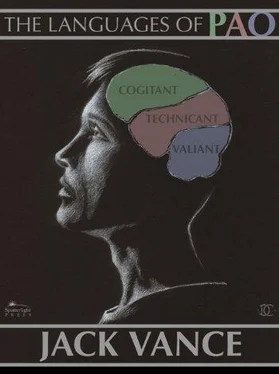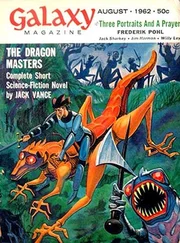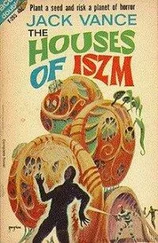Beran’s resolve to return to Pao was difficult to implement. He had neither funds to buy, nor authority to commandeer, transportation. He tried to beg passage for himself and the girl; he was rebuffed and ridiculed. At last frustrated, he sulked in his rooms, ignoring his studies, exchanging hardly a word with Gitan Netsko, who spent most of her time staring blankly along the windy chasm. Beran one time inquired what she found of interest in barren stone and windy haze, to which she replied that she saw none of it, nothing except the thoughts which passed before her eyes.
Three months passed. And one morning Gitan Netsko remarked that she thought herself pregnant.
Beran stared at her incredulously. Barely adolescent himself, he had never envisioned fathering a child. He took Gitan Netsko to the clinic, registered her for the pre-natal regimen. His appearance aroused surprise and amusement among the staff of the clinic.
“You bred the child without assistance? Come now, tell us: who is the actual father?”
“She is indentured to me,” Beran stated, indignant and angry. “I am the father!”
“Forgive our skepticism, but you appear hardly the age of virility.”
“The facts seem to contradict you,” Beran retorted.
“We shall see, we shall see.” They motioned to Gitan Netsko. “Into the laboratory with you.”
At the last moment the girl became afraid. “Please, I’d rather not.”
“It’s all part of our usual routine,” the reception clerk assured her. “Come, this way, if you please.”
“No, no,” she muttered, and shrank back. “I don’t want to go!”
Beran was puzzled. He turned to the reception clerk. “Is it necessary that she go now?”
“Certainly!” said the clerk in exasperation. “We make standard tests against possible genetic discord or abnormality. These factors, if discovered now, prevent difficulty later.”
“Can’t you wait until she is more composed?”
“We’ll give her a sedative.” They laid hands on the girl’s shoulder. As they took her away, she turned an anguished glance back to Beran that told him many things that she had never spoken.
Beran waited—an hour, two hours. He went to the door, knocked. A young medic came forth and Beran thought to detect discomfort in his expression.
“Why the delay? Surely by now …”
The medic held up his hand. “I fear that there have been complications. It appears that you have not sired after all.”
A chill began to spread through Beran’s viscera. “What sort of complications?”
The medic moved away, back through the door. “You had best return to your dormitory. There is no need to wait longer.”
Tears swelling at his eyes, Beran ran forward, groping to hold back the door. “Tell me, tell me!”
But the door closed in his face, and there was no further response to his signals …
* * *
Gitan Netsko was taken to the laboratory, where she submitted to a number of routine tests. Presently she was laid, back down, on a pallet and rolled underneath a heavy machine. An electric field damped her cephalic currents, anaesthetized her while the machine dipped an infinitesimally thin needle into her abdomen, searched into the embryo and withdrew a half-dozen cells.
The field died; Gitan Netsko returned to consciousness. She was now conveyed to a waiting room, while the genetic structure of the embryonic cells was evaluated, categorized and classified by a calculator.
The signal returned: “A male child, normal in every phase. Class AA expectancy.” The index to her own genetic type was shown, and, likewise, that of the father.
The operator observed the paternal index without particular interest, then looked again. He called an associate, they chuckled, and one of them spoke into a communicator.
The voice of Lord Palafox returned. “A Paonese girl? Show me her face … I remember—I bred her before I turned her over to my ward. It is definitely my child?”
“Indeed, Lord Palafox. There are few indices we are more familiar with.”
“Very well—I will convey her to my dormitory.”
Palafox appeared ten minutes later. He bowed with formal respect to Gitan Netsko, who surveyed him with fear. She had experienced nothing but pain at his hands; none of her imaginings had prepared her for the callousness of his breeding.
Palafox spoke politely. “It appears that you are carrying my child, of Class AA expectancy, which is excellent. I will take you to my personal lying-in ward, where you will get the best of care.”
She looked at him blankly. “It is your child that I carry?”
“So the analyzers show. If you bear well, you will earn a bonus. I assure you, you will never find me niggardly.”
She jumped to her feet, eyes blazing. “This is horror—I won’t bear such a monster!”
She ran wildly down the room, out the door, with the medic and Palafox coming behind.
She sped past the door which led to the room where Beran waited, but saw only the great spine of the escalator which communicated with levels above and below.
At the landing she paused, looked behind with a wild grimace. The spare shape of Palafox was only a few yards behind. “Halt!” he cried in passion. “You carry my child!”
She made no answer, but turning, looked down the staircase. She closed her eyes, sighed, let herself fall forward. Down and down she rolled, bumping and thudding, while Palafox stared after her in amazement. At last she came to rest, far below, a limp huddle, oozing blood.
The medics took her up on a litter, but the child was gone and Palafox departed in disgust.
There were other injuries, and since Gitan Netsko had decided on death, the Breakness medicine could not force life upon her … and she died an hour or two after her fall.
* * *
When Beran returned the next day he was told that the child had been that of Lord Palafox; that, upon learning of this fact, the girl had returned to the dormitory of Palafox in order to collect the birth-bonus. The actual circumstances were rigidly suppressed; in the society of Breakness Institute, nothing could so reduce a man’s prestige, or make him more ridiculous in the eyes of his peers, than an episode of this sort: that a woman had killed herself rather than bear his child.
For a week Beran sat in his cubicle, or wandered the windy streets as long as his flesh could withstand the chill. And indeed it was by no conscious will that his feet took him trudging back to the dormitory.
Why had she gone to Palafox? Had she been promised swifter return to Pao? … Pao! Waves of homesickness swept over Beran. Pao, blue with water, green with leaves, warm from the sunlight! Pao! His only escape from misery was to return to Pao! Never had life seemed so dismal a panorama.
He reacted from his stupor and dullness with an almost vicious emotion. He flung himself into his work at the Institute, wadding knowledge into his mind to serve as poultice against his grief.
Two years passed. Beran grew taller; the bones of his face showed hard through his skin. Gitan Netsko receded in his memory, to become a bittersweet dream.
One or two odd things occurred during these years—affairs for which he could find no explanation. Once he met Palafox in a corridor of the Institute; Palafox turned him a glance so chill that Beran stared in wonder. It was himself who bore the grievance, not Palafox. Why then Palafox’s animosity?
On another occasion he looked up from a desk in the library to find a group of high-placed dominies standing at the side, looking at him. They were amused and intent, as if they shared a private joke. Indeed this was the case—and poor Gitan Netsko had provided its gist. The facts of her passing had been too good to keep, and now Beran was pointed out among the knowledgeable as the stripling who had, to paraphrase, ‘out-bred’ Lord Palafox to such an extent that a girl had killed herself rather than return to Palafox.
Читать дальше







